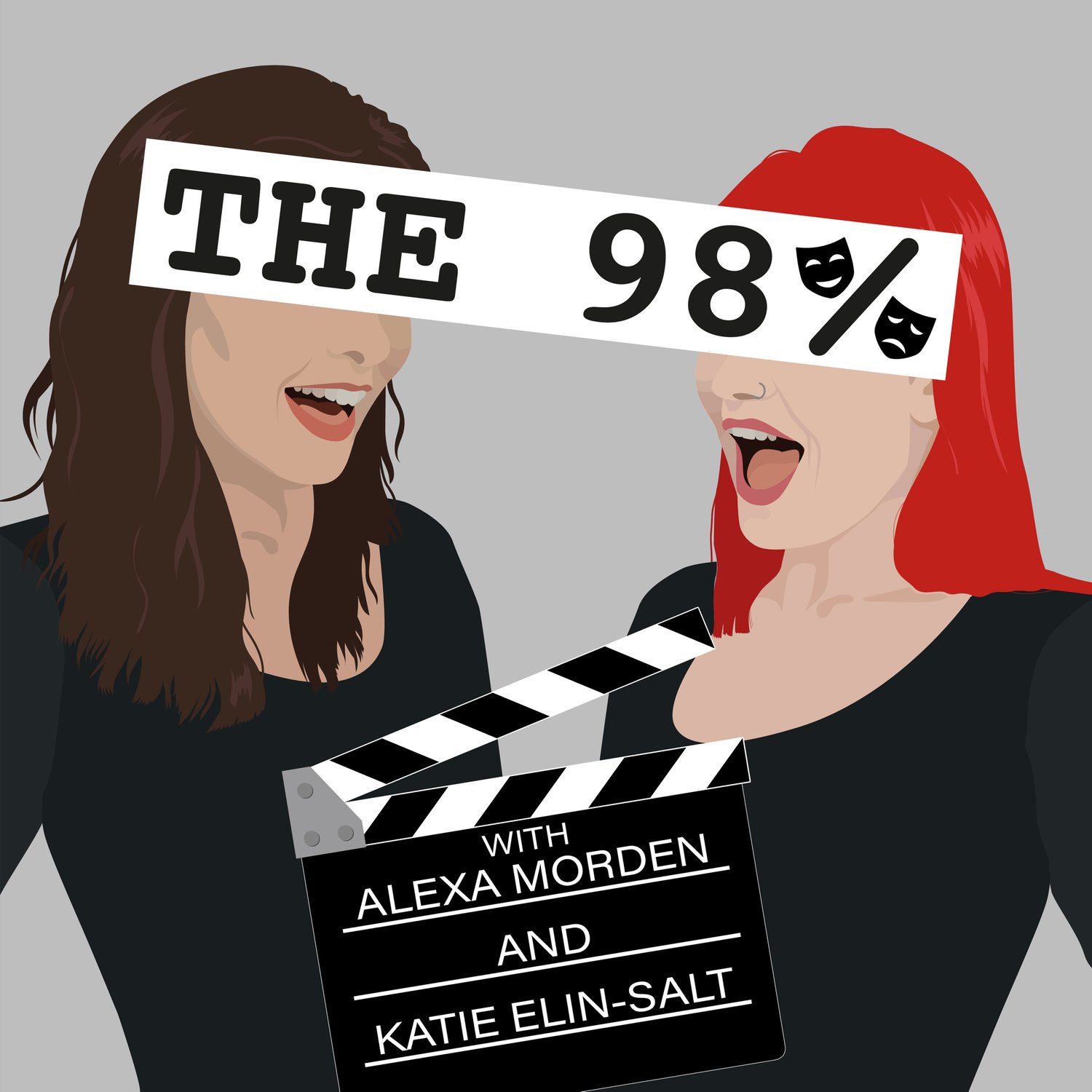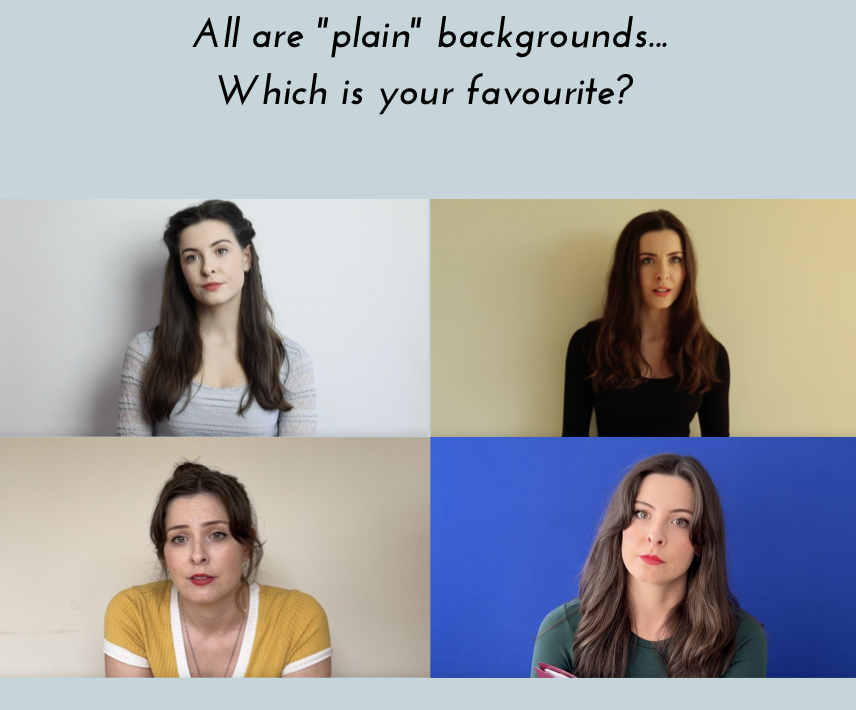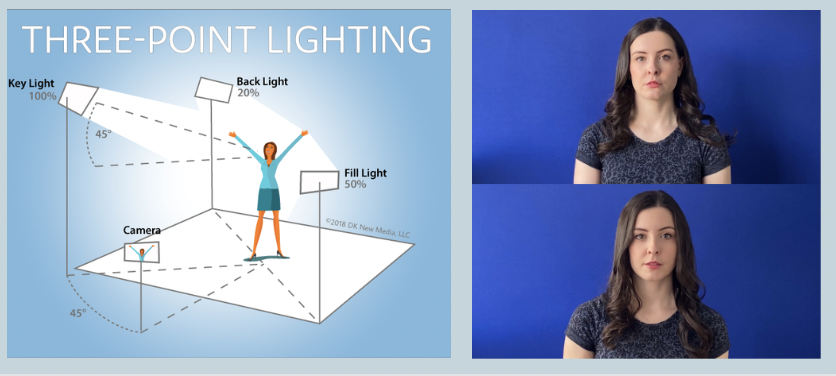By Alexa Morden
While self tapes aren’t new, the pandemic catapulted them into the everyday life of actors around the world. For some people self taping is a saving grace, making auditioning more accessible. For others, they can be a pain the arse. For most, it’s a bit of both. While in some cases auditions are moving back into the room, self taping isn’t going anywhere. And while you may be the most brilliant actor - there are technical aspects to the art of self taping that can really make a difference. If you’ve got the taping foundations down and are ready to “level up” your self taping game - below are some tips to make the most out of every self taping opportunity and to help you get to a place of excitement and readiness for the chance to tape, instead of the usual faff!
Part 1 will cover the technical logistics of recording a self tape, while Part 2 goes into detail about the art of self taping and the performance side of the task.
PART 1 - THE TECHNICALITIES
1 - backdrop
Expectation: A neutral coloured, plain background free from distractions.
Level up: Consider investing in a coloured backdrop. (Blue or Grey are the standard choice)
Why?
While most casting directors don't want to put the pressure on and happily accept tapes against a plain white wall, a self tape specific backdrop can emulate a studio, get rid of distracting shadows, completely change how you look on camera and really make you pop! Also, if you are auditioning for something that may be casting a wider net for the search, self tape standards/expectations in North America can be higher and you may be up against actors who are paying to go to self tape studios or have an at-home studio. You want your tape to hold up!
How?
1) Buy a pop up back drop that you can fold away and store when not using (£30 - £50 on amazon)
2) Stick up some photography paper (you may need to buy a whole roll off of an online wholeseller but you can cut up pieces to give/sell on to friends! This also gives you more of a choice of colour for which specific shade suits you best)
3) If your accommodation allows..paint a section of your wall the intended colour!
Do some research on what colour is best for your skin tone...for example, grey tends to wash out those with paler skin
2 - lighting
Expectation: Well lit with minimal shadows.
Level up: Find a space where you can use natural light from windows. Don't back light yourself! Have the light coming from in front of or beside you. Consider investing in some lights, you can go all out with studio-esque lighting boxes, or buy an inexpensive ring light - a bonus with ring lights is they come with a built in tripod and place to hold your phone.
Why?
Lights are an added expense which, for most of us, we can do without. This is where a pop up backdrop can come in handy..some come with a stand or you can lean it against a chair/table meaning you can pop it up anywhere! ie...the place you get the most natural light to make the most of it!
How?
1) Have a friend help you figure out the best positioning/if curtains need to be drawn/where you should stand in proximity to the light. For example..the below screenshots were taken 2 seconds apart! One = direct sunlight into the room, the other = curtain is drawn. Completely different looks!
2) Remember daylight can differ! Sometimes overcast days are better than harsh sunlight! (See point above!)
3) If you want to get fancy with lights...brush up on technical knowledge ie 3 point lighting!
3 - camera and sound
Expectation: Be seen and heard clearly.
Level up...?: Unless you still have a Nokia 3310..there's no need to! Smart phones do an excellent job nowadays. The screenshot on the left was using a white studio backdrop, professional lights and a canon camera with an external microphone attached - all the gear. The screen shot on the right was with a pop up backdrop, natural lighting, and an iPhone!
4 - exporting and sending
Expectation: Submit on time and follow instructions
Level up: *Always* ensure your tapes are UNDER 100mb, ideally even smaller. Follow instructions *to a T*.
Why?
Larger files can clog up casting directors computers fast and take ages to download. It also can affect upload time when they then send them onto directors/producers. Following instructions goes without saying...casting have included instructions for a reason - don't make their job harder by making yours the odd one out!
If there are no instructions consider asking your agent/casting the following....
Would you like a slate/indent included?
Shall I include a title card with my headshot/contact details?
How would you like it labelled? (Project name_Your name_Character name is a good standard!)
How?
1) Filming resolution...
*No need to shoot any higher than 720p HD*
Apple products - Settings / Photos & Camera / Record Video
Android - Video Camera settings / Video Resolution or Recording Format
Then choose the resolution - No 1080p HD or 4K!!
2) Exporting as under 100mb...
iMovie - Share / File / Adjust resolution /Use 'quality' slide bar to adjust even lower until file size is below 100mb
OR File compression apps...
Apple products - Video Compress
Android - VidCompact
Desktop - Handbrake
3) Send via WeTransfer or Hightail
Upload to dropbox, vimeo or YouTube (note: MAKE PRIVATE!!)
remember…
Casting directors want you to do your best and your best is your best, whatever that may look like, in whatever circumstances. Your acting, choices and commitment to the scene is what is most important. But if you're looking to make improvements these points might be a good place to start! The pandemic has turned self tapes from an occasional expectation to the norm, they aren't going anywhere and you want them to be the best they can be!
Part 2 - The Craft
1 - rehearse
A mistake actors make is having the learning and running of lines be the main focus.
Rehearse! Just like you would for an audition in the room, or even a theatre audition. A self tape is very intimate as the camera is tight on you. Rehearse movements, eye-lines, reactions, props (only if absolutely needed) and do a dress run of the tape before you have your reader in. Watch the rehearsal back on camera! You might notice you turned your head too far, your eyes were darting around too much, a moment you thought was conveyed may have gotten lost. Recording a rehearsal also allows you to finesse lighting, sound, and playing out the beats of the scene.
2 - READER
This can be the most stressful part of self taping for many, but a live reader is always the best option.
Casting directors understand that it's not always possible to have a reader in the room. That being said, pre-recorded lines with gaps, superimposing the other person's lines after, reading the other lines in yourself or having no reader at all..should be a last resort. "Acting is reacting" after all! Having to time when you say your lines and not being able to have the freedom to be sponantoues and present, can distract you from doing your best work. Having an actor as your reader is also the safest bet...they shouldn't be too animated/loud/attention catching, but give you enough to work with.
Bonus to self taping: YOU can direct your reader to deliver lines in a way that best serves YOUR choices in the scene!
Don't have a live in reader?
Ask a friend to hop on zoom/FaceTime
Create a group of actors in your area that you can call on and return the favour when needed
Use WeAudition! Heralded by many top casting directors, WeAudition is an online community where you can find readers, be paid to be a reader, and even find acting coaches to make your tape the best it can possibly be! **Use our code 9825 for 25% off!**
3 - EYELINES
The eyes are one of the most important elements of your self tape and unclear eyelines can be distracting.
Have your reader stand behind the camera and slightly to the side. Practice this and watch back to make sure it doesn't look like you're looking down the lens OR looking too far off.
If there is another character/s in the scene, use sticky notes on the wall to make the added eyeline clear and in the same place every time you look at 'them'.
Framing for taping should be head and shoulders so bear in mind that lots of movement can be distracting - it's all in the eyes. Be careful not to move your eyes around too much and have your eye movements be deliberate and with reason. You can say a lot with the eyes without actually speaking!
TIP: Watch close ups in tv/film closely and make note of how little/often actors move their eyes and when/why they do in regards to the scene and their objective within it.
4 - TIME LIMIT
Agents are talking of 'self tape fatigue'...keep it fresh and exciting!
Self tapes can be stressful for many reasons, so obviously work in a way that feels best for you, BUT doing a scene again and again and again...and again, can be detrimental. Casting aren't looking for perfection or for it to be "right". They are looking for interesting nuances, truth, presence and that you're having fun! Elements that are usually found in the first couple takes. When you do a take you like and then do it again trying to recreate what you've already done..it can make scenes stale and forced. Putting a time frame/take limit into effect helps with this. It could be a 3 take maximum rule (considering there are no huge mistakes), or making sure you finish within half an hour (depending on how long the scenes are). This is where rehearsal comes in again...your first few takes shouldn't be your warm up!
5 - WATCH YOURSELF BACK
A take might have "felt" good to you..but how did it look?
It's common for actors to have bad habits and self taping is the perfect chance to catch these. Before you move on to the next scene, or decide to go again...watch the scene back first! To look out for technical elements you might want to change or unnecessary movements or distractions, OR to notice the beats/moments you really like that you may want to make more of/find more detail in. A self tape will look very different to how the actual scene in the project will look. For example; you may need to look down at a computer or something in the scene...this should be cheated so you're actually looking just below the camera instead of how you'd look down in real life. Things like this are camera techqniues that can be learned and practiced.
6 - PRACTICE
When the art of self taping becomes second nature you can focus on what matters most - what you can give to the audition. Self taping is the same as anything...the more you do it, the better you become! Ways to practice and get better:
Watch your old tapes back and see how far you've come and what makes your tapes better now than before
Organise a group of friends/fellow actors to work on scenes with and share your tapes. Find scenes/speeches off of tv shows and films to transcribe, record and watch each other. This is also a great way to see how different actors have different choices for the same scene
Take part in casting director Manuel Puro's self tape challenges 'The Acting Habit'....
Manuel developed The Acting Habit to encourage actors to embrace the art of self-taping by providing them with affordable guidance from the very first steps, up to interacting with leading casting professionals from around the world. There are 5 day challenges or 21 day challenges where every day you receive sides and have 24 hours to record and upload the tape for the guest casting director.
PROS in taking part:
Detailed help on how to perfect your self tape set up
Guaranteed feedback from the guest casting director, which can also help with your general audition technique
The open forum element means you can watch tapes from the other participants, leave comments for others and see what you like in other people's performances/taping set ups
An inside look into what a casting director does. Being able to see how different actors give different readings of the same scene is validating in that it reminds you that booking a role doesn't usually come down to talent and ability - some reads just fit the vision in a different way!
Get more information at
purocasting.com/the-acting-habit
Manuel has been running The Actor’s Habit for many years and has been a champion of self tapes long before they became the norm. Having taken part in this workshop twice myself, and from hosting Manuel on the podcast, I can say with certainty that it really is a supportive and helpful course - run by someone who genuinely wants to help actors and see them succeed. You can hear Manuel talk about his love of self taping and tips and advice he has on Series 2 Episode 3 of The 98% - listen here!
And CHECK THIS OUT! Manuel has generously given us a 20% discount code for the first 100 people to sign up to The 21-Day Self-Tape Challenge! You can choose any start date and as long as all the vouchers haven’t been used up, use the code “98PERCENT”.
I hope this has provided some help and insight into making your tapes as good as they can be. You can also find this information on the podcasts instagram page @the98percentpod under the highlight reel “Actor Support.”
Would you like a more personal approach to support for self taping? I am so happy to be offering affordable and relatable coaching for actors. Having sent off 100+ self tapes over the past couple years alone, I am well versed in the art of self taping. And auditioning in both the UK and North America, where expectations around self tapes can be very different, has given me unique insight. Check out our “Help For Actors” page, and use the “Contact” form to get in touch! I would love to help you level up your self tape game, be a reader for your audition, help coach a self tape, or work on some audition sides with you!
“Alexa is awesome! She's a great actor and has lots of experience in the acting world. Lovely insights into the scene we read with great notes to really nail this self-tape. AND great career advice!
Don't miss out, book her!”
-Sven, actor
Alexa is an actor, animal/nature lover, crafter, and all round creative. As founder, producer and co-host of The 98% she has released 100+ episodes of the podcast over the past 6 years, providing a first of its kind look at the realities of being an actor. Featuring industry professionals from all corners of the industry, Alexa has gained valuable insight into the many facets of working in the entertainment industry and is excited to be using this, and her 10+ years of professional experience, to coach and mentor fellow actors with realistic, relatable and tangible advice. You can find her at @alexamorden on twitter or @alexa_morden on instagram. You can follow the podcast everywhere at @the98percentpod for more relatable #actorslife content!




